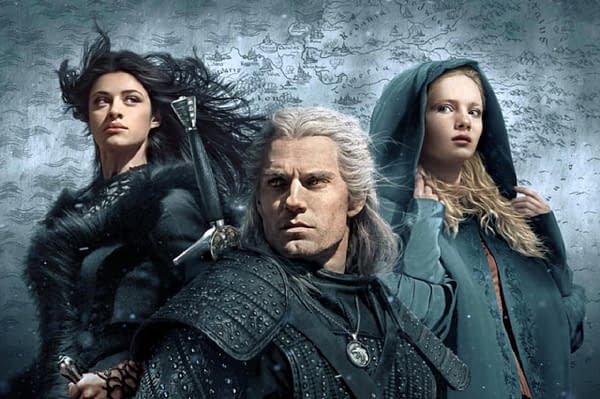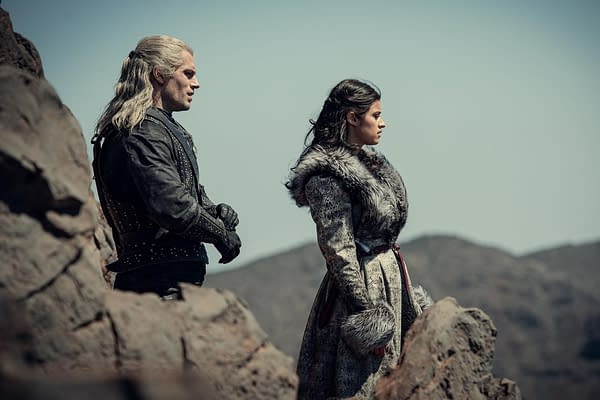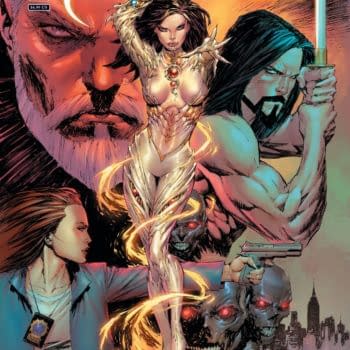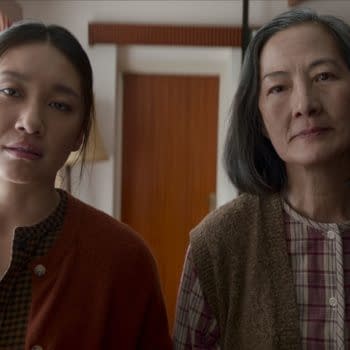Posted in: Netflix, Opinion, TV, TV | Tagged: Andrzej Sapkowski, Anya Chalotra, Freya Allan, henry cavill, Lauren Hissrich, netflix, opinion, the witcher
The Witcher: Sexists Be Damned! The Show Isn't Feminist Enough!
The Witcher showrunner Lauren Hissrich has been engaging with sexist gatekeepers on social media for days who accused her of making the show too "woke" and taking the focus away from manly hero Geralt of Rivia (Henry Cavill). They could not be more wrong. We're here to tell you why.

The Witcher show is an adaptation of Andrzej Sapkowski's books more than the games, though the franchise's global popularity came about because of the games. The books would never have become famous in the English-speaking world if the games hadn't become so popular. Anyone who's played the games and read the books would know that 1) All the main female characters are powerful, even politically. Geralt is always in their power and at their mercy. They could destroy him or have him killed if they wanted to. 2) In the 5 novels after the first 2 short story collections that set up the characters and the world, Geralt is not the main character. Ciri is. Geralt and Yennefer become more supportive characters for her. The feminism is already built into the Witcher saga from the beginning, including the games. Maybe the sexists forgot this because they only remember the parts of the game where Geralt is whacking away at a monster with his sword.
The gatekeepers whining that the series is too "woke" have it all wrong – the show is not feminist enough. It keeps painting Yennefer as a victim when she's the most dangerous sorceress in that world. Then in season 2, it makes her suffer by having her lose her magical powers (this arc is not in the books or game). It seems to do that as a default Screenwriting 101 choice – the easiest and cheapest choices so that there would be Conflict.
The Witcher Series Still Makes Yennefer Too Much of a Victim
Case in point: in the season 1 climax, Yennefer (Anya Chalotra) accidentally taps into her full power and unleashes fire magic that stops the Nilfgardian invasion that basically nukes their army and burns them into a crisp. The show depicts this as the usual anime/fantasy trope of accidentally discovering and unleashing that power. She's a victim of it. In the books and games, Yennefer would have chosen to unleash it and damn the consequences.
The craziest thing in the show is the other sorceresses treat Yennefer like an annoyance instead of a nuke that could kill them all. In the game and books, they're all respectfully wary of her and work with her to plot policy and strategy, knowing she's willing to break any rule and taboo, even the most dangerous ones if it suits her. They can't even plot to kill her because she's way too powerful and dangerous.

The show has a puritanical streak by portraying magic as a burden and almost a punishment. The books and games show that for mages and sorceresses, magic is a responsibility but also an enormous privilege. Every female character on the show is joyless and miserable, which is baffling. We hate to keep bringing up the books and the games since a show should be treated as its own entity, but when the sorceresses in the books and the games are shown enjoying their power many times, the show seems to punish them for having power. Yennefer is frequently a victim. Triss is shown to agonize. Ciri (Freya Allan) lives in fear of how powerful she is. The show seems to push the lesson that power is terrible and should not be desired. That's odd considering the one job of a feminist narrative is to advocate that women should embrace, control and enjoy their power. None of the men in the show are punished or made to agonize over having magical power the way the women are.
The more interesting question for Lauren Hissrich is why she and her writers choose not to let Yennefer and the sorceresses be confident and powerful instead of constantly fretting and agonizing over their magic. Magic has currently used in the fantasy genre as a metaphor for the hidden power that women discover in themselves. In The Witcher, it's used as a cause for their guilt, their burden, and their joylessness. Why doesn't the show let the women revel and take joy in their power?
The Witcher is streaming on Netflix.














